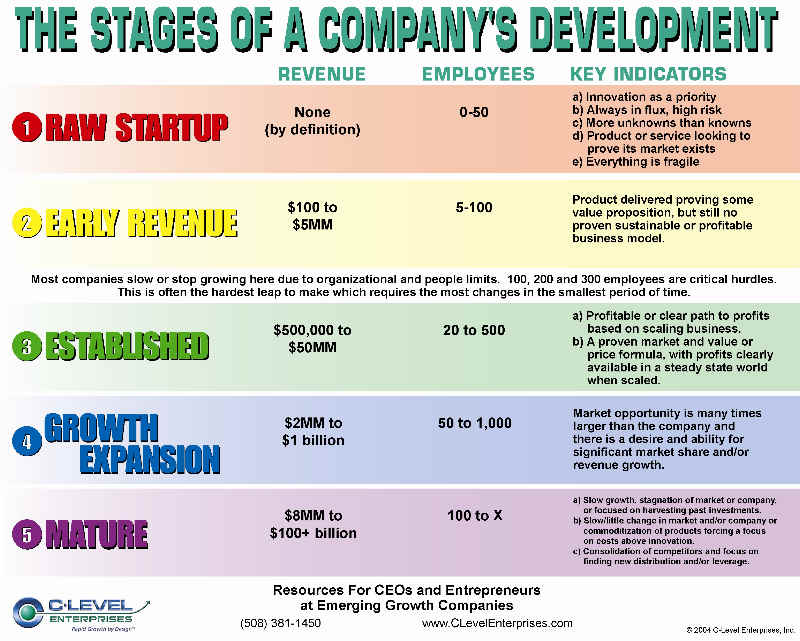Leadership Lessons for Emerging Growth Companies

Adjusting Your Management Style To Your Company's Stage, A miniseries on practical leadership focus for start-ups and emerging growth company senior executives.
This series will explore how leadership focus and skills must evolve as a company grows from a raw startup to an expansion stage, successful enterprise. Most seminars, texts, and articles talk about leadership generically as if it had the same requirements in all situations. It does not, and in fact, the key elements of success at each stage of a company's development are always very different.
Leadership is a skill that is hard to develop, but usually easy to recognize. It is an ability some are born with, but it also is one that anyone can develop with some guidance and practice. Usually, you need the outside perspective of someone without any agenda or bias to improve. We all are unaware of things about ourselves that everyone else is aware of. These things must be identified and improved to be a successful leader. No leader can lead without intimate self-knowledge and insight.
Like many decisions and other things, leadership style and many key decisions are very dependent on your company's stage of development. Doing something one way might be very appropriate at a raw startup, but doing this same thing would be a big mistake at a more mature company. Let's examine how the focus of leadership must evolve as a company grows.
A leader in a large company spends lots of time making speeches in front of large groups and talking to the media. The messages must be enormously simple and repeated constantly. To be carried accurately through many levels and/or other people, they are "dumbed down" to the simplest possible core message. The message must often speak to the least common denominator.
To learn more, click here
President Bush is a master of these "simply stupid" messages. Howard Dean said on Meet the Press that Bush is a master of saying the same simple message four times a day for twenty days. We could debate why, but at that level of communicating to 350 million Americans and six billion people worldwide, it may be the only effective way.
A leader in a small startup however is "hands-on". Show-them-how-to-get-it-done person. This is the other end of the spectrum, with lots of time to communicate with each individual one-on-one, and many complex messages are needed. Leaders in small companies must demonstrate lots of specific domain expertise that gives people the confidence to join in and follow them towards a vision they can not see or fully understand themselves. They must trust that the leader sees and understands this vision because the leader has more knowledge, experience, and wisdom. Most people are followers; I believe this was an evolutionary imperative to allow humans to form social groups and survive. The alpha wolf of the wolf pack, right or wrong, causes things to happen and action is more important than being right every time. In any complex world, some amount of trial and error is necessary.
At this early stage, the leader's specific domain expertise, experience, and wisdom are experienced one-on-one. Personal charisma plays a role, as does their communication skills and style. It can be much harder to lead a small team of good people than it is to lead a larger group from afar. Being there, you are subject to the scrutiny of the people you are leading every day. Large company leaders and politicians have many layers of protection and can expose only what they want to the masses. Small company leaders have day-to-day personal contact and must continue to build or maintain respect with each interaction. Good leaders in small companies create a team approach with a flat organization where everyone can communicate freely to everyone else without formal organizational hierarchy.

We will use the five-stage company development model below to explore how leadership evolves from a raw startup to a mature company. I use this model as a key element in all advice given to CEOs, and all our products are rated for particular stages. This is because the answer to any question can literally be 180 degrees different for a stage #1 company than for a stage #3 company. Select where your company is here before proceeding. Then we will explore key leadership attributes needed at each stage of company development.

Leadership Attributes Needed at All Times
Consistency and leadership by example are needed at all stages. No one is going to follow a leader for long who says one thing and does another. This is foundational to form trust and respect with people. At the same time, people will always criticize what they do not understand when it is above their ability to understand it. This Monday morning quarterbacking is also a fundamental problem in leadership at any size company.
Most employees have no idea what a CEO does day-to-day and some even think we sit in our office all day enjoying ourselves and collect the big paycheck because we are lucky, know someone, or are just plain politically savvy. They discount the intelligence and drive needed. They have never, and will never, understand the experience, talent, work, risk, and hard decisions needed to grow a business. Few employees will have the commitment and be willing to make the sacrifices needed to found and grow a company. This must just be accepted as a reality and understood.
 |
Learn more about our Growth and Scaling (GSP) |
|
For a free video consultation call on what your |
Decisions CEOs make are more complex than most people will ever be capable of understanding and we need to understand and empathize that this stuff is WAY above most people's ability to grasp it. Individual contributors will only understand one area of the business well and they will see everything a CEO does differently through those glasses. They can not possibly weigh decisions appropriately taking into account the other five or six disciplines needed to make a good decision. CEOs must understand eight to ten areas of the business 50% as well as any employee who does that job. These include sales, marketing, finance, product development, operations, management, people, hiring, and other areas. Therefore we need to know literally five times as much as anyone else and integrate that balancing act of factors to do the best we can for the higher-level corporate objectives.
This issue needs to be managed very well by a good leader. I have often spent several meetings with managers over many weeks to have them understand issues better when I knew immediately from experience what the correct decision was. If I dictated this decision without them understanding why I would be viewed as a dictator and probably also as incorrect and egotistical. This would inevitably lead to discontent among the managers and others. This perception would be incorrect because I was better qualified to make that decision. However, it would be the only information they had to go on, and hence their perceptions would become reality in their minds and likely also the minds of others.
This is not meant to be a "no one knows the trouble I have seen" kind of sympathy play but is just a harsh reality of the knowledge base a CEO must have as compared to others in the company. CEOs are certainly not always right, but they do have the broadest perspective on the business for decisions that impact the entire company. However, they should often defer to specialists in many areas when the decisions are more tactical and not influenced by knowledge from other areas of the business.
Attributes all leaders must project at any stage of a company's development:
- Confidence (sometimes quiet and sometimes not). A strong ego is necessary to start a company, but it must be tempered and not worn on your sleeve.
- Knowledge of the business landscape and competition.
- Respect for other people and their input in your decisions. Caring and empathy for other people's problems and weaknesses.
- Honesty and ethics.
- Strong -communication skills. This means context-sensitive communications that early on includes lots of one-on-one high bandwidth and deep communications with individuals to form your team
- Drive and commitment to the mission.
Join the course How to Raise Millions from Outside Investors
Bob Norton is a long-time Serial Entrepreneur and CEO with four exits that returned over $1 billion to investors. He has trained, coached and advised over 1,000 CEOs since 2002. And is Founder of The CEO Boot Camp™ and Entrepreneurship University™. Mr. Norton works with companies to triple their chances of success in launching new companies and products. And helps established companies scale faster using the six AirTight Management™ systems. And helps companies successfully raise capital.
What can we help you with today? Scaling, training, consulting, coaching?
Call (619) SCALE06 or (619) 722-5306 9am-6pm CT
Or Schedule a free 30-minute strategy session by clicking here.





